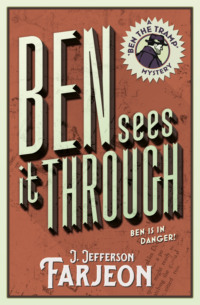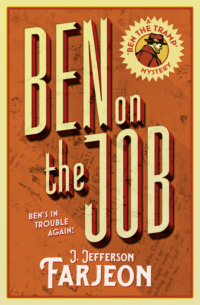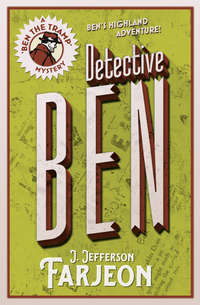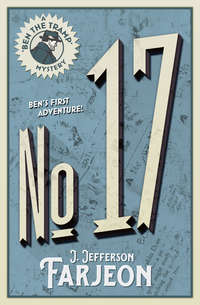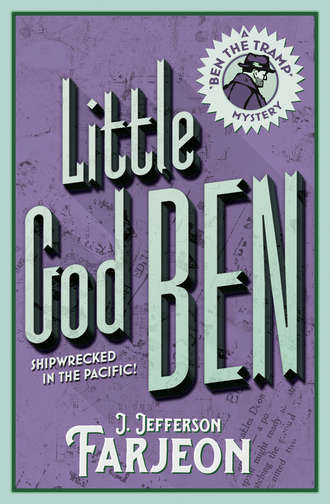
Полная версия
Little God Ben
‘I am a company promoter, Mr Haines,’ replied Lord Cooling. ‘You can count on my optimism implicitly.’
But Haines had suddenly ceased to listen. His eyes gazed beyond Lord Cooling towards the beach. The other little heaps were stirring, and the heap he was most interested in had risen and was coming towards them.
As Ruth Sheringham approached, her sodden blue dress clinging to her pathetically but in no way, Haines considered, detracting from her charm, her lithe body stiffened, and she stopped. But she only paused for a few seconds. She came on again without any visible signs of panic.
‘Well done, Miss Sheringham,’ said Haines.
‘Did you think I was the fainting kind?’ she retorted. ‘Aren’t they pretty?’
‘Go on!’ muttered Ben in astonishment.
Lord Cooling regarded Ben with growing disapproval.
‘Historians of the future may deduce that Miss Sheringham did not quite mean what she said,’ he suggested with frigid sarcasm, ‘and they may also record that a stoker who talked too much was presented as a peace offering to a cannibal chief!’
‘Well, ain’t you torkin’ too much?’ retorted Ben, with a boldness he would never have shown on the ship. ‘We sed we was goin’ ter keep mum abart them cannerbuls!’
‘Cannibals?’ repeated Ruth.
‘Will you shut up?’ Haines exclaimed to Ben.
‘Well, why does heverybody sit on me?’ answered Ben. ‘I was born sat on, and I’m fair sick of it, that’s a fack!’
Lord Cooling sighed.
‘If you will give me your name and permanent address,’ he said, ‘I will write you a letter of apology and post it in the nearest pillar-box. Meanwhile, here come the others. It appears to be a tortoise race—with, I notice, our film star an easy winner. Well, perhaps their voices will be a little more useful than our own—’
He stopped abruptly, gazed at something on the ground, stooped, and picked it up. It was a small white object.
‘What’s that?’ inquired Haines, arrested by the other’s rather ominous interest.
‘I hope a beef-bone,’ murmured Lord Cooling.
Haines stepped nearer Ruth. In spite of her tight hold on herself, she had given a little shiver.
‘Cold, isn’t it?’ she smiled. The sunlight, gaining in intensity every minute, gave her the lie. ‘In these wet things, you know.’
‘Yes, I know, Miss Sheringham,’ Haines smiled back, reassuringly. ‘And I know something else—there’s nothing whatever to be worried about.’
‘Course not,’ nodded the girl. ‘Everything’s just too lovely to believe!’
Then the four other little heaps drew up and stared at the hideous statuary. It was Elsie Noyes who, forgetful of the discipline of a girl guide captain, expressed the common emotion by exclaiming:
‘Oh, my God!’
If she forgot her part, so did Ardentino and Henry Smith, whose faces would not have been recognised in Elstree or Wembley Park. Ernest Medworth, on the other hand, soon reverted to type. He found himself staring at the golden eyes, and wondering what they were worth.
‘Someone’s been busy here!’ he commented.
‘Yes, I don’t imagine these things came up from seed,’ answered Cooling.
‘Ha, ha, very funny!’ laughed Smith, uneasily. ‘That’s good, that is! They’re not exactly roses!’
He laughed alone. The fact depressed and annoyed him. Dash it all, did they think he felt like laughing? But one had to try to put a cheerful face on things—one had to be British, and all that. Pity there weren’t a few of his train companions here to help keep the old flag flying.
He tried again. ‘Well, you’ve got to say it’s pretty here,’ he remarked. ‘Take away the waxworks, and it’s a bit like Rottingdean before they spoilt it.’
‘Don’t make us home-sick, Mr Smith,’ pleaded Lord Cooling, cynically.
‘The fellow’s an idiot!’ grunted Medworth.
Smith’s cheeks flamed. ‘What’s the matter with everybody?’ he snapped. ‘Can’t one make a passing remark?’
‘The sooner your remarks pass, the better!’ retorted Medworth, rudely. ‘This isn’t the time for reminiscences!’
‘Now, now, we mustn’t lose one’s temper, that’s the first thing one mustn’t do!’ cried Miss Noyes, quoting from her book of rules. ‘If these—these heathen gods or whatever they are mean that the place is inhabited, well, we know where we are, that’s something, and we must organise against them—organise!’
She was hardly the best tonic for frayed nerves. Smith was the only member who was grateful to her. She had at least diverted attention from himself.
‘I suppose that is what they mean?’ inquired Ardentino, glancing towards the Third Officer.
‘That this island’s inhabited?’ replied Haines. ‘Yes, there’s not much doubt about that.’
‘Well—er—we want it to be inhabited, don’t we?’
‘Depends upon the inhabitants,’ answered Medworth.
‘Yes, we only move among the best people,’ added Ruth. ‘What happens if they’re not in Debrett?’
The question was not answered. Somewhere in the forest, a twig snapped.
Personal differences were forgotten. For ten seconds eight people stood motionless. The gods themselves were not more still. Then another twig snapped.
‘I think,’ suggested Lord Cooling quietly, ‘we swallow pride—momentarily—and take cover?’
‘I don’t think—I know!’ muttered Medworth.
‘Nah fer the runnin’ race!’ said Ben.
And led it.
5
Behaviour of Mr Robert Oakley
Ben led the race at the start, but he had to share honours at the end. The result was a dead heat between himself and four others, and there was considerable crowding at the large rock of concealment that formed the winning-post.
The losers were Ruth Sheringham, Tom Haines, and Lord Cooling. They had started late, and with a little diffidence. Lord Cooling, although he had been the first to suggest retreat, did not like turning his back on an enemy. Many charges would be brought against him when he met his Maker, but not that of cowardice. An ancestor of his had fought at Crecy. Haines shared his distaste for running away, and was by no means certain that it was good strategy; but the sight of Ruth, standing beside him and waiting for her cue, had made him gulp down his pride, and he had suddenly seized her arm and rushed her to the rock. Lord Cooling, bringing up the rear, had endeavoured to mingle dignity with haste until a new sound had urged him to shed the dignity. ‘After all,’ he reflected, as his feet sped faster than they had sped since Eton, ‘if one is going to run, one may as well run.’
The new sound certainly provided plenty of excuse. It was a mournful chanting.
At first the chanting was wholly eerie. It drifted forward from the forest, a depressing dirge that lacked the slightest gleam of hope. ‘Sahnds like a corpse singin’!’ thought Ben, and it was not a bad description. The slowness of the corpse’s approach added to the painful tension.
But, before the chanter appeared, the sharpest brains—not Ben’s—became conscious of a curious psychology. There was something elusive in the chanting, something vaguely at war with itself. Did it represent religious fervour, or sheer boredom, or a combination of both? The words, when at last they became decipherable, afforded no clue. They were, as far as could be determined:
‘Waa—lala,
Waa—lala,
Oli O li,
Waa—lala.’
This doleful sound was repeated, with occasional pauses, until the chanter emerged from the forest through a narrow track and came into sight.
His appearance was even more arresting than his song. He was a complete anachronism. On his head was a wreath of feathers. In his hand was a gruesome receptacle formed out of a painted skull suspended from three short chains. But, instead of the nakedness or partial nakedness that should have accompanied these primitive indications, soiled ducks encased the chanter’s rather stout body. Soiled? Let us be frank and admit that they were filthy. Even Ben’s low standard of cleanliness was startled.
Obviously British—his atmosphere of dry resignation was characteristic of his race—he appeared to have ‘gone native’ through local necessity rather than through any acquired enthusiasm for native ways. His bored expression indicated quite plainly that he was merely performing a duty forced upon him.
The duty itself carried on the strange story. Reaching the first of the effigies, the chanter stopped his chanting, took from his pocket a handkerchief that matched his ducks, dusted the effigy, and knelt before it. Then, with bowed head, he repeated:
‘Waa—lala,
Waa—lala,
Oli O li,
Waa—lala.’
Rising, he glanced back towards the forest, took out his handkerchief again, blew his nose, moved to the second effigy, and repeated the whole performance, but with a slight variation. This time the dirge ran:
‘Waa—lala,
Snowden and Bala,
Ochy Och-aye,
Waa—lala.’
This version stamped him so definitely as a Briton that Haines made a movement to leave his concealment; but Lord Cooling stretched out a detaining hand. ‘Let us hear the rest of the performance,’ he whispered. ‘One only learns a bird’s habits while it is unconscious.’ Haines nodded.
But the rest of the performance was mere repetition, adding nothing to their knowledge until the fifth pedestal was reached. The one that was empty.
Then, for the first time, the chanter’s face registered something akin to emotion. He stared at the pedestal, rubbed his eyes, stared again, and exclaimed:
‘Purple blazes!’
He stooped. His hands groped in the tangled undergrowth. They brought up the head and shoulders of a fifth statue. The fifth statue looked, even allowing for distance, the smallest of the group, and it was obviously broken.
‘Now I’m for it!’ said the chanter, as he dropped the portion back into the undergrowth. ‘Orate pro anima Oakley!’
He smiled rather sadly. He was taking the situation well. But he took the next situation even better, for when he raised his eyes and saw eight figures emerging from behind a rock, he might have been reasonably excused for leaping out of his skin. Instead, he merely stood quite still and counted them.
‘That the lot?’ he inquired politely.
The absurdity and inadequacy of the greeting delayed the response. The shipwrecked party had yet to learn the peculiar mood and temperament of Mr Robert Oakley. His next remark was even more unexpected.
‘Who won the last Cup Tie?’ he asked. ‘Dear old Arsenal?’
Then Ben became practical.
‘Look aht!’ he exclaimed. ‘’E’s looney!’
Ben’s curiosity, which often got him into difficulties, had drawn him a little ahead of the rest. He had a remarkable faculty for rapid movement, retreating in a straight line and advancing in a curve. He wondered now, as their queer host’s eyes fastened on him, whether the moment had not arrived for another straight line. The eyes gave him a very odd sensation. He had likened Oakley’s chanting to that of a corpse, although strictly speaking he had never heard a corpse sing. These eyes, also, looked somehow dead, and in their solemnity lay a defunct smile …
‘Looney?’ repeated the subject of the theory. ‘Shouldn’t wonder. I’ve no means of tellin’. It’s so long since I had anything sane to compare myself with. But quite harmless, believe me—quite harmless. Despite old Yorick!’
He swung the skull he was carrying towards Ben, and Ben retreated into the chest of Lord Cooling. Lord Cooling cleared his chest and then his throat.
‘When you have finished babbling, sir,’ he said, ‘would you mind informing us who the devil you are?’
‘I asked my question first,’ replied Oakley. ‘Did Arsenal win the Cup?’
‘What the deuce does that matter?’ rasped Cooling. ‘Do you play football here?’
‘Not matter?’ blinked Oakley incredulously. ‘Not matter? You are English, aren’t you?’
Haines and Ruth exchanged smiling glances. Terror lay behind them, and more terror lay ahead of them, but for the moment life was almost amusing.
‘Derby County,’ said Haines. ‘Jolly good match.’
‘Thank you, brother,’ answered Oakley, and then repeated, as though he were repeating the name of his sweetheart, ‘Derby County!’
Ernest Medworth swore.
‘How much more rope are we going to give this fellow?’ he demanded. ‘Enough to hang himself I don’t mind, but is this delay going to hang us?’
‘Would you like me to try to deal with him?’ suggested Smith.
‘What he needs is discipline!’ declared Miss Noyes.
‘Or a charge of gun-powder,’ proposed the film star.
‘I can tell you what you all need,’ observed Oakley unruffled. ‘Patience and calmness. It’s the only thing that gets you anywhere on this island. I’ve had three years of it, so I know. What is going to happen is going to happen, and no amount of agitation will alter it.’
‘Yus, but wot’s goin’ ter ’appen?’ asked Ben.
‘That,’ returned Oakley, waving a hand towards the statues, ‘is literally in the lap of the gods. By the way, one’s got knocked over. Did you do it, by any chance?’
‘Wot, me?’ exclaimed Ben.
‘Yes, in a fit of jealousy. Oomoo looks something like you.’
‘’Oo ’oo?’
‘Oomoo. Our little God of Storms. I rather like Oomoo. Something almost human about him. But the others—the larger ones—well, let me introduce you. Hojak.’ He waved towards the tallest. ‘He’s the God of Fire. I’ve never quite got over my distaste for the feller. Mooane. The chap with the toothache. God of Water. Kook. God of Earth. Gug. Both g’s pronounced hard, as in chewing-gum. God of Eatables. H’m.’ He paused. ‘We don’t much care for Gug. And, finally, Oomoo, who appears to have been demolished last night by one of his own storms.’
The introductions did not have a soothing effect.
‘And who are you?’ inquired Lord Cooling. ‘Not for the first time of asking?’
‘Who am I? Oh, yes. Well, I was Bob Oakley before I got washed up here three years ago. What I am now I’ve never quite found out. I think it’s a sort of Low Priest. If that sounds good, forget it. A Low Priest is an office boy to a High Priest. You must meet our High Priest—he’s a dear chap. One of my duties, as you may have noticed, is to do the Caruso stuff to the Ugly-Mugs and dust ’em on Fête Days—’
‘Fite Dyes?’ interposed Ben inquiringly.
‘Same thing,’ nodded Oakley. ‘I’m supposed to sprinkle ’em, too, with the contents of Yorick, but there’s been so much rain during the past forty-eight hours—has it been the same in London?—that I gave the wash a miss. No one was looking—apart, of course, from yourselves.’
‘No doubt about it,’ growled Medworth, ‘the fellow’s stark staring mad.’
‘That is my devout hope,’ Lord Cooling admitted. ‘I am hoping that Mr Oakley got such a bump when he arrived here three years ago that he has been suffering from delusions ever since. But in any case, Mr Medworth, we have no other source of information at present, so—with your permission—?’
‘Carry on, my lord,’ grunted Medworth. ‘You’re the spokesman.’
‘Thank you.’ Cooling turned back to Oakley. ‘You mentioned a Fête Day. Is this one?’
‘Always, after a storm,’ answered Oakley.
‘What happens on Fête Days, in addition to the—spring cleaning of the gods?’
‘We eat and thanksgive.’
‘Eat?’
‘Eat.’
‘What do you eat?’
‘Well,’ said Oakley, ‘you haven’t been thrown up on a Eustace Miles Restaurant.’
‘Ah,’ murmured Lord Cooling, dropping the little white object he had till now retained. ‘Not a beef-bone!’
As a good girl guide, Miss Noyes attempted to quell certain signs of panic.
‘Now then, my man!’ she exclaimed sharply. ‘Don’t try to frighten us with any nonsense!’
Oakley gave one of his rare faint smiles.
‘You needn’t be frightened, ma’am,’ he assured her. ‘They don’t care for Cochran Young Ladies. Prefer ’em round and Victorian. I say,’ he added suddenly, ‘are there still Cochran Young Ladies?’
Miss Noyes having failed in her mission, Haines now made an effort.
‘Mr Oakley,’ he said, ‘we are trying to bear with you, but please realise that—in your sense—we are novices. Are you really and truly serious in all you’re saying?’
‘And what about Noel Coward?’ asked Oakley. ‘Has he written anything since Private Lives? Dashed good! Oh, and is the Income Tax still five bob? That’s one thing you’ll be spared here.’
‘Damn it!’ exploded Medworth. ‘We’ve been wrecked!’
‘Well, I didn’t suppose it was a train accident. Did somebody ask me something?’
‘Yes, I asked you whether you were really and truly serious,’ repeated Haines.
‘Abart the grub,’ explained Ben, ‘’cos if yer are, I’m tikin’ the next boat ’ome!’
‘I like you, Little Tich, ’pon my soul, I do,’ said Oakley. ‘Oh, yes, quite, quite serious. I’ve come to believe this last month or two that I’m being quietly fattened.’ He held out an arm and regarded it. ‘Getting a bit too meaty for my pleasure. But they’re not bad fellers, really. Not comic opera villains, you know. Real pukka chaps. There’s one little girl …’ He stopped and shrugged his shoulders. ‘Treat ’em right, and—according to their religion—they’ll treat you right.’
‘They sound perfectly delightful!’ observed Ruth.
Oakley looked at her. He appeared to be noticing her definitely for the first time. Something crept into his eyes. Haines was quick to remark it. But he also remarked that the something was instantly quelled, and that Oakley’s eyes had resumed their protective moodiness when he replied.
‘That’s the idea,’ he nodded. ‘Just simple and primitive. Never known any different—poor blighters.’
‘Tha’s right,’ said Ben.
In the little silence that ensued, while apprehensive glances were directed toward the silent forest, Ben wondered why he had said it. He did not know that it was the dawning of an instinct destined to determine vital issues on the island and to bear astonishing fruit. Were they poor blighters? If they’d never known any different, well, there you were, weren’t you? And that little girl—she’d probably be black, like the rest—but he’d like a squint at her. He’d seen a picture of a little black girl once in a magazine. She hadn’t looked so bad. Of course, she had been black. But she’d been smiling. What did black girls smile at? Same things as white girls? Had the photographer said, ‘Now, then, when I say “Three,” watch out for the little mouse’ …
Miss Noyes’s voice, thin and precise, brought him out of his reverie.
‘But, surely,’ she was saying, ‘there have been some missionaries?’
‘What for?’ inquired Oakley. ‘To teach them about the jolly old slums?’
‘Tha’s wot I calls a good ’un!’ grinned Ben.
‘You like it?’ inquired Oakley, regarding him with interest.
Before Ben could reply, Lord Cooling froze him through his monocle.
‘We are intensely interested in what you like and what you do not like,’ he said, ‘but I think we can exist without this information!’ Then, turning to Oakley, he continued, ‘But your own information, Mr Oakley, is more important. Before I finally rid myself of the hope that you are a raving lunatic, will you kindly explain to me how it is that you can talk of—of being fattened as though you were merely discussing the weather—how you can speak of football and Cochran and Noel Coward at a moment like this—and—’
‘Yes, and why you weren’t surprised to see us!’ interrupted Smith, deeming it time for Wembley to get in a word. ‘That wasn’t natural, was it? Why, if you meet a pal in the tube, you say, “By Jove,” or something!’
‘Quite right,’ agreed Medworth.
‘There you are!’ cried Smith, warming under this approval. ‘Shall I tell you what I call it? Fishy! I believe the whole story’s spoof! Where are these cannibals? Yes, and what’s more, I believe he made these damn statues himself! Now, then, sir, no more lies—let’s have the truth, this time!’
He was not used to making speeches. He turned, flushed, to Miss Noyes. She nodded in agreement. He turned to the Third Officer.
‘I am quite sure Mr Oakley did not carve these statues,’ said Haines rather shortly.
‘And I don’t know what Mr Smith means by fishy,’ added Ruth. ‘Does he mean that Mr Oakley wasn’t surprised because he arranged the wreck and expected us?’
‘Let us confine the present charge to lunacy,’ interrupted Lord Cooling frigidly as Smith subsided, ‘and suggest that three years alone on this island have—slightly?—turned Mr Oakley’s head!’
Oakley maintained the uncanny composure that was being complained of till the voices ceased. Then he looked at Lord Cooling thoughtfully and remarked:
‘My reactions disturb you?’
‘You don’t appear to react at all,’ answered Lord Cooling.
‘I see. Well, might this explain it? For the last three years I have lived on a cannibal island where the Chief has twenty-one wives—God help him—where the High Priest drinks out of his predecessor’s skull, where twins are sacrificed, when they occur, to the new moon—fortunately, they occur less often than the new moon—where the word “Holalulala” means “Take his eyes out” and “Lungoo” means “Fried knuckles,” and where there is a Temple of Gold that would make the Bank of England’s mouth water.’
‘What’s that?’ exclaimed Medworth sharply.
‘So, after all, perhaps it is natural that my bump of surprise has got a little blunted,’ went on Oakley. ‘And you can take it from me. I have done everything in my power to assist the blunting process. If that sounds good, forget it. There are two ways of going mad. You can get raw and feel everything, or you can get numb and feel nothing. I’ve got numb. As soon as I begin to feel anything, I knock it on the head. Course, one gets caught a bit sometimes.’ He paused and glanced towards Ruth, then turned to Lord Cooling again. ‘It would give me the greatest pleasure, sir, to smash that monocle out of your blasted eye. I wouldn’t mind squashin’ the feller who called me fishy under my foot, though I’ve a notion he’d feel slimy. If I kissed that pretty girl over there—first I’ve seen of my own race for three years—I would probably recall a very pleasant sensation. But I only allow little emotions. The infants in arms. Big ’uns—taboo. So you’re safe from me, the whole damn lot of you. Note—from me. As for t’others, why worry? Think of yourselves, and then compare yourselves with the stars. Millions. Billions. Trillions. It’s just amusin’.’
One man, at least, was uninterested in the philosophy of Mr Robert Oakley.
‘Pardon me,’ said Medworth, ‘but would you mind repeating that about a Temple of Gold?’
The next moment everybody was uninterested in Mr Ernest Medworth. A faint sound was beginning to disturb the silence of the forest. The slow and distant beating of a drum.
‘The Campbells are coming, hurrah, hurrah,’ observed Oakley unemotionally. ‘Well, good luck, chaps.’
He turned to go, but Medworth seized his arm.
‘Wait a minute—where are you off to?’ he demanded. Medworth’s voice contained plenty of emotion.
‘Pity about your complexion,’ answered Oakley. ‘Try and do something about it.’
‘Shut up, you fool, and answer my question!’
‘Certainly. I’m off to report.’
‘Do you mean you’re going to tell them about—us?’
‘That’s exactly what I mean. The presence of you and the absence of Oomoo. They’re apt to be a bit over-excitable when they’re not prepared for surprises.’
Medworth let his arm go and turned to the others.
‘What do you think about it?’ he exclaimed. ‘Don’t you think he ought to stay?’


